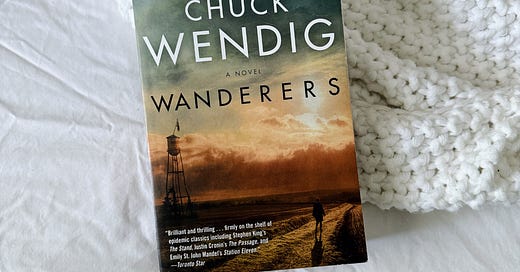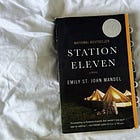Generative AI is not interesting in theory. Discussions of future merits and impending societal threats sound similar to any other technological advance. It reminds me of this Gilmore Girls episode where Rory pitches a story about the digital streaming revolution, but Paris nails her angle to the wall before she can even get started - “CD sales are declining, but revenues are up, blah blah blah.” Most AI conversations recycle the same fears and predictions with slightly different angles - students paying ChatGPT to write their papers is not shocking to anyone who’s ever been to an American high school. I have begun to tune it out, for better or worse.
However, put AI in narrative form, sell it to me between two pieces of decorative cardboard, and you’ve got my attention.
Notably, this specific front piece of cardboard must know me personally, evident by the quote in the bottom corner - “firmly on the shelf of epidemic classics including Stephen King’s The Stand, Justin Cronin’s The Passage, and Emily St. John Mandel’s Station Eleven.” I cannot shut up about the brilliance of these novels, so great idea on Wendig’s part to join the parade. I questioned his angle, though - with so many greats coming before him, how would he differentiate his story? By running with the AI conversation and showing exactly what can happen when the science outwits the scientist.
Smart House me
We start with patient zero, a sleepwalker named Nessie. Slowly, more and more people join her on a mysterious mission to an unknown destination, unthwarted by physical barriers or emotional pleas. Family and friends guard the flock as they trek across the United States and encounter a myriad of ecological and anthropogenic threats. The CDC is called in to solve the mystery with the help of a super AI machine called Black Swan that Smart Houses the shit out of everyone. Strange characters join the mess, including an aging closeted rockstar and a debilitated former policewoman, who really ratchet up the drama.
At the same time (!), a disturbed cave of bats bites a wealthy man who turns into a walking psychotic fungus and kicks off a 99.9% lethal world epidemic. The same CDC and a bunch of other smarty scientists now have two strange happenings to solve at once. Throw in some white supremacist religious fanatics and a lot of interpersonal drama, and we’ve got a 780-page novel to read.
Coffee > humankind
**Before we go any further - Wanderers knows its audience and its references. Characters mention The Stand directly, and Wendig seems hyper-aware of the writers that have come before him. You could even read this book as an ode to King (searches indicate he references other King works as well). I found it charming that he acknowledges his forebearers. Naturally, there are a lot of comparisons to The Stand forthcoming.
Somehow, the disappearance of coffee feels worse than the disappearance of all humankind.
Let’s start with this one: the dichotomy at play is man vs. virus and man vs. man - the haters and the hate-nots, if you will. If it wasn’t enough to have society decimated by a deadly fungus that causes hallucinations and grows mushrooms out of your face, there is the extra threat of nationalistic white-supremacist religious-pretending f*cks that see a deadly epidemic as a chance to “take back” America. Excellent tension building that creates a compelling triangle of hostility.
But where The Stand has a supernatural element, Wanderers turns to AI. Threats are natural (fungal virus), man-made (racist f*cks), governmental (useless politicians), and now scientific (artificial intelligence). Therefore, we add man vs. computers to the mix. Black Swan plays as religious foil - a seemingly omnipotent, incorporeal intelligence with an unidentifiable agenda. Where one side invokes traditional gods to rail against the virus, the other invokes a computer intelligence that surpasses its creator. I mean, truly, the dynamics at play here are genius.
Humankind was a disease. The earth was the body. Climate change was the fever.
Also like in The Stand, we get a kaleidoscopic cast of characters, multiple POVs, competing interests, and plenty of mystery. While some of the voices grated on me (the teenage Shana character already feels very dated even though it was only published in 2019), the scientific research necessary for the realistic CDC character dialogue was highly impressive. The character development is moderately satisfying, if not in expected patterns. While it does grapple with large themes, what kept me turning pages was really the sheer voyeurism of AI versus fungus.
There were also pockets of moving and visceral writing, walking that tightrope between sci-fi and horror. An NPR review calls it “poetic brutality”:
The tree the human corpse hangs from is bare and brutish, a dark and skeletal hand reaching toward a wide sky choked with the smoke of distant wildfires. The corpse belonged to a man, once, his age indeterminable. The skin and the clothes are colonized with white fuzz that looks not unlike a mass of caterpillars. Seven tubules have emerged from his mold-claimed flesh, each snaking up toward the sky, bulging at the end like a pimple straining to be popped by impatient fingers.
The images of those succumbing to the madness and physical terror of the virus will stay with me for a while, especially in this post-COVID, post-The Last of Us society.
Verdict👩⚖️: I really liked Wanderers, and I fear that I have now reached the end of the epic epidemic novels out there. Wendig wrote a sequel titled Wayward about reconstructing society with those left, so at least I have that.
For Fans Of 🖤: The Stand or Stephen King generally, post-apocalyptic novels, sci-fi with a horror twist, long books with multiple POVs, epic good vs. evil battles, or reading mostly for plot.
Further Reading📚: As usual, many people had problems with Wanderers on Goodreads, complaining of nothing happening and characters as cardboard cutouts. It may not be a literary masterpiece, but it gave me something to chew on, as it did in these three reviews.
These 'Wanderers' Are Heading For The End Of The World
Wanderers by Chuck Wendig on Fantasy Review
Wanderers a Kirkus Review
Do you like epidemic or post-apocalyptic novels? If you’ve read Wanderers, let me know your thoughts in the comments.
In Case You Missed It 🖤
This newsletter contains affiliate links. If you purchase using one of the links above, I will earn a baby-sized commission at no cost to you. Comment, share, repost, upgrade to paid, or buy me a coffee to support my work. Follow me @ thebookcreep on Instagram for pretty book pictures. Your support (monetary or not) is why I keep going, so thank you.
See you around the bookshelf!
Natalie










Have you read The Fog by James Herbert? I know Stephen King was a big fan of it (and Herbert’s first book, The Rats, which is utterly terrifying) and it sits in the same family of epidemic type novels, with the fog being the mechanism of transmission. Maybe one of the first in the genre?
I haven't read Wanderers yet, but I'm a big fan of Chuck Wendig, as a human and as a writer. His blog posts are pretty epic. Way back, I read his novel Invasive, a thriller about weaponized ants in Hawaii. It's Jurassic Park-adjacent and VERY entertaining. (https://strongsenseofplace.com/weekend_getaway/2019/10/11/fight-a-deadly-ant-swarm-and-sip-a-pina-colada-in-hawaii-with-invasive/)
And then last year, I devoured (sorry) Black River Orchard. What a story! It's pretty much the perfect read for fall: small town, murderous apples, lots and lots of interpersonal drama. Loved it so much! (Apologies if you've read it and written about it already; I'm a new subscriber. Really enjoying your book picks!) —Mel